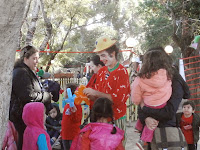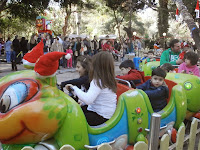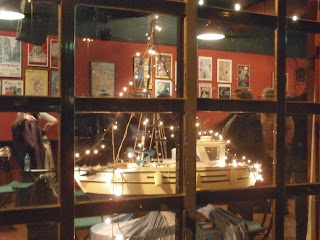Their Patience Has Ended, But No Earthquake Here
Another Blow for the
Old Guard: Unsettling the Establishment
 The lack of a majority consensus
and the downfall of the old political elite are emphasized by the large number
of parties competing for votes--43 for European Parliament and almost as many
for local elections in Chania. Greeks voted for their preferred party on 5.5 X
14 inch paper ballots for European parliament (yes, a lot of parties, and a lot
of paper!), including an animal husbandry party, a Trotskyite party, an
anti-capitalist party, four communist parties, two socialist ones, two
environmentalist parties, and a large collection of centrist and right wing
parties whose names don’t identify their ideologies so clearly. Some of the
successful candidates, such as the new mayor of the major port city of Pireas,
are primarily associated with soccer teams. Even SYRIZA won barely more than a quarter of
the votes. The barely-defined new party To Potami, or The River, made a relatively
strong showing in fifth place, as did one of several communist parties in sixth
place, so it’s clear that no single party will satisfy any majority of Greeks.
Many don’t know where to turn--to the right, to the left, or to the center.
The lack of a majority consensus
and the downfall of the old political elite are emphasized by the large number
of parties competing for votes--43 for European Parliament and almost as many
for local elections in Chania. Greeks voted for their preferred party on 5.5 X
14 inch paper ballots for European parliament (yes, a lot of parties, and a lot
of paper!), including an animal husbandry party, a Trotskyite party, an
anti-capitalist party, four communist parties, two socialist ones, two
environmentalist parties, and a large collection of centrist and right wing
parties whose names don’t identify their ideologies so clearly. Some of the
successful candidates, such as the new mayor of the major port city of Pireas,
are primarily associated with soccer teams. Even SYRIZA won barely more than a quarter of
the votes. The barely-defined new party To Potami, or The River, made a relatively
strong showing in fifth place, as did one of several communist parties in sixth
place, so it’s clear that no single party will satisfy any majority of Greeks.
Many don’t know where to turn--to the right, to the left, or to the center.
Most
troubling, to many of us here, is 9.4% of voters’ sharp right turn toward the
neo-Nazi Golden Dawn party, even with several of its leaders and members in
jail facing criminal charges which include links to violence against immigrants and leftists (see, for example, “Golden Dawn leader and No 2 jailed before trial”),
as if almost a tenth of voters believe scapegoating people from outside Greece
is the solution to the country’s problems. Last year, when the governing
coalition finally decided to crack down on some Golden Dawn members and leaders
for their alleged links to crimes, charging them and jailing them pending
trial, I thought ordinary Greeks would recognize how dangerous the group is. However,
the move seems to have backfired, as Golden Dawn claims to be the victim of a
political witch hunt, hands out free food to Greeks who show their IDs to prove
their nationality, and helps elderly Greeks make their way safely through
crime-ridden streets in Athens. Golden Dawn provides some services that the austerity-starved
state does not offer, so now even many non-fascist Greeks look to them for help.
This shift toward xenophobic ultra-nationalist parties has been recognized as a
phenomenon throughout Europe, where such parties made significant gains in
European Parliament membership, along with other “Euro-sceptic” parties who
don’t believe the European Union should continue to exist.
The Rites and Rains
of School and Spring
It
rained mud the other week, and again the other day—or at least rained very
muddy drops. I didn’t believe that could really happen before I moved to Crete,
but a look at all the cars after such a rain makes it clear—as mud. Sounds like
Greek politics or education. The major concern of Greek high school seniors and
their parents has now shifted away from politics, to the dreaded annual
Panhellenic university entrance exams, when 105,000 students compete “for
70,305 spots, which will determine whether they will get into their university or
technical college of choice”—or any public college or university in Greece ("Greek seniors start battle for university placement").
I’ve complained at length about the Greek educational system already (see my
October 2013 blog), but I have to admit that some surprising, impressive
successes do emerge from it, such as the Athens Law School students’
first-place finish in “the global Moot Court Competition on May 18 at the World
Trade Organization headquarters in Geneva, Switzerland, beating a team from
Harvard University” ("Greek law students take first prize at Moot Court").
What is even more impressive: a public secondary education is free for the
students who pass these horrendous exams. That’s an amazing reward, from an
American perspective, but simply an entitlement, in the Greek view. The problem
is that it follows a cruel feat of endurance that costs parents thousands of
euros, and students years of childhood. Those years and euros are lost because
so many teens have to give up many, if not all, their extracurricular
activities (most of them not offered at public schools, either) in order to
attend costly private night school classes which may run until 10:00 or
later—after which they are expected to study for both public and private school
lessons. The struggle comes early in Greece, rather than lasting for years, as
it does for American college students who pile up outrageous debts.
 College-bound
Greek high school seniors are known to work harder than anyone else in the
country, so I figure they’re totally burnt out and ready for time off when they
enter university—which explains frequently lackluster academic performances as
university students, especially in the first year or two. (As I’ve said, there
are important exceptions to this.) But before they can begin their often
relaxed university careers, they must do a very good job regurgitating
memorized material on seven three-hour exams taken on different days from May
28 to June 12. Parents share their children’s stress and take time off work to
wait outside schools during exam hours. Never mind high school achievement or
extracurricular activities—this is it. For those who think SATs and ACTs are
bad, just look at the Greek system; a recent evaluation calls it the worst in
Europe ("Greek education ranked worst in the EU").
But if nearly one quarter of the Greek population (including babies and small
children) cannot pay their taxes ("Debts to state grow by over 1 bln euros every month"),
the Troika insists on more and more budget cutbacks, and a large percentage of Greeks
also work for the private school or tutoring system that prepares students for
entrance exams, how can the situation be improved? This is another question to
which Greeks respond with τί να κάνουμε
(what can we do?) and υπομονή (patience)—or ας’ το,
“oss toe” (leave it, as in “I don’t want to think about it”).
College-bound
Greek high school seniors are known to work harder than anyone else in the
country, so I figure they’re totally burnt out and ready for time off when they
enter university—which explains frequently lackluster academic performances as
university students, especially in the first year or two. (As I’ve said, there
are important exceptions to this.) But before they can begin their often
relaxed university careers, they must do a very good job regurgitating
memorized material on seven three-hour exams taken on different days from May
28 to June 12. Parents share their children’s stress and take time off work to
wait outside schools during exam hours. Never mind high school achievement or
extracurricular activities—this is it. For those who think SATs and ACTs are
bad, just look at the Greek system; a recent evaluation calls it the worst in
Europe ("Greek education ranked worst in the EU").
But if nearly one quarter of the Greek population (including babies and small
children) cannot pay their taxes ("Debts to state grow by over 1 bln euros every month"),
the Troika insists on more and more budget cutbacks, and a large percentage of Greeks
also work for the private school or tutoring system that prepares students for
entrance exams, how can the situation be improved? This is another question to
which Greeks respond with τί να κάνουμε
(what can we do?) and υπομονή (patience)—or ας’ το,
“oss toe” (leave it, as in “I don’t want to think about it”). So let’s change the subject. The day before the first round of municipal and district elections, we drove through a maze of Chania streets, then turned toward Theriso, in the foothills of the White Mountains. Theriso itself is more interesting theoretically, as the birthplace of the great statesman Eleftherios Venizelos, than as a place to visit, aside from two small, picturesque churches and a multitude of tavernas to serve the tourists on one of the little open-sided train-buses you’d expect to see in an amusement park parking lot rather than a Greek mountain village. Maybe we missed something, aside from the historical monuments and small former school that’s become a museum focused on the Greek resistance fight during WWII, but the drive through the Theriso Gorge struck me as more intriguing than the village. I love these Cretan gorges, with their winding roads between irregular, steeply rising rock walls, some wooded, some rough, and others smooth, exposing the varied colors of mineral deposits smoothed down by the elements. In the little museum in Theriso, some of the photos of resistance fighters were blocked by two makeshift voting booths, with large, heavy-duty clear plastic boxes ready to hold completed ballots on election day. The two young girls staffing the museum said voting took place there because there were no longer enough children in the village for it to have its own school.
 Farther along the single-lane road
that winds through the hills beyond the village, we found the Dounias Taverna
or “Traditional Center of Gastronomy of the Cretan Diet,” as they advertise,
with its most appealing tables across the road, on a hill with a tranquil view
of forested valleys. Owner Stelios Trilirakis proudly showed us into the
kitchen, with its multitude of clay pots full of rich dishes prepared from
local organically-grown produce and livestock. A procession of creatively
prepared foods soon began to trickle out to our table, from the unusual mixed
salad of purslane, artichoke, tomato, olives, and more to the tzatziki made
with carrots and the surprisingly rich, filling cauliflower with carrots and
hondros (a sort of homemade dried bread). The procession of foods did not stop
with what we ordered; several additional samples, including meat and stuffed
vegetables, appeared courtesy of Stelios, even after D declared himself too
full to eat another bite and the kids and I gave up trying to fit more into our
stomachs and wandered off with Stelios’s small son to see their rabbits, chickens,
turkeys, pigs, and cow and pick a few of the wildflowers still blooming at this
higher elevation. Yet that profusion of tasty food was followed by a plate of
loquats and an astonishingly reasonable bill. Completely stuffed, we headed
home by a different route below some of the stunning cloudy skies of Crete that tourists miss during
summer's clear blue heat. Winding
along a narrow road toward Aptera, we reached a high plateau with an impressive
view of Souda Bay, Chania, and the Akrotiri Peninsula spread out below us.
Farther along the single-lane road
that winds through the hills beyond the village, we found the Dounias Taverna
or “Traditional Center of Gastronomy of the Cretan Diet,” as they advertise,
with its most appealing tables across the road, on a hill with a tranquil view
of forested valleys. Owner Stelios Trilirakis proudly showed us into the
kitchen, with its multitude of clay pots full of rich dishes prepared from
local organically-grown produce and livestock. A procession of creatively
prepared foods soon began to trickle out to our table, from the unusual mixed
salad of purslane, artichoke, tomato, olives, and more to the tzatziki made
with carrots and the surprisingly rich, filling cauliflower with carrots and
hondros (a sort of homemade dried bread). The procession of foods did not stop
with what we ordered; several additional samples, including meat and stuffed
vegetables, appeared courtesy of Stelios, even after D declared himself too
full to eat another bite and the kids and I gave up trying to fit more into our
stomachs and wandered off with Stelios’s small son to see their rabbits, chickens,
turkeys, pigs, and cow and pick a few of the wildflowers still blooming at this
higher elevation. Yet that profusion of tasty food was followed by a plate of
loquats and an astonishingly reasonable bill. Completely stuffed, we headed
home by a different route below some of the stunning cloudy skies of Crete that tourists miss during
summer's clear blue heat. Winding
along a narrow road toward Aptera, we reached a high plateau with an impressive
view of Souda Bay, Chania, and the Akrotiri Peninsula spread out below us.

































